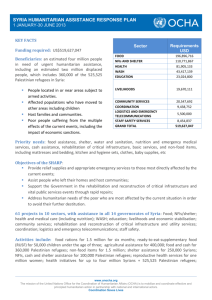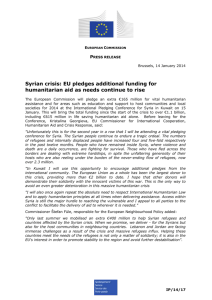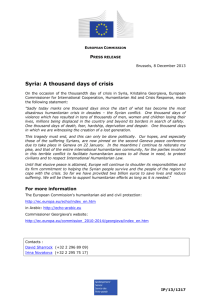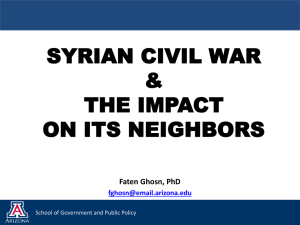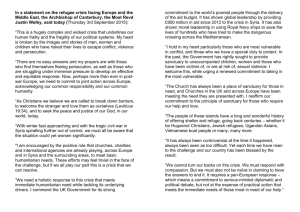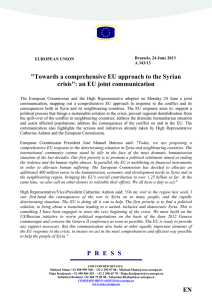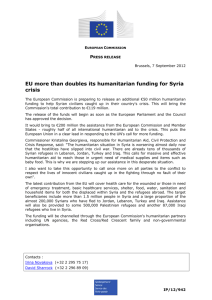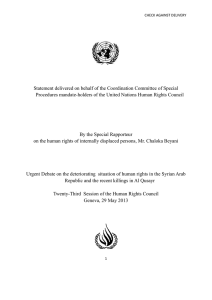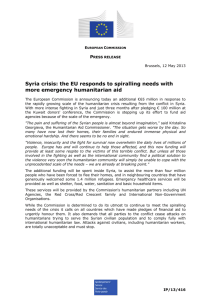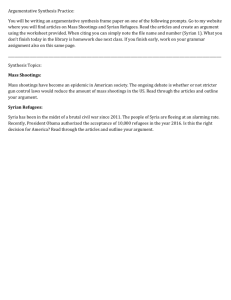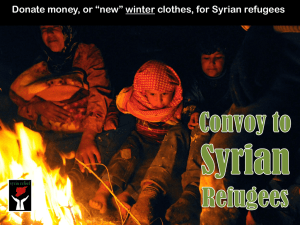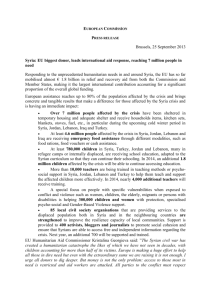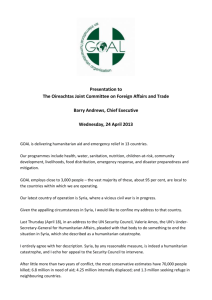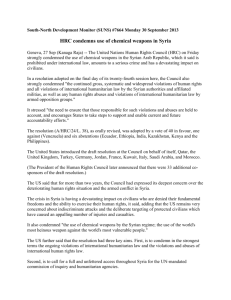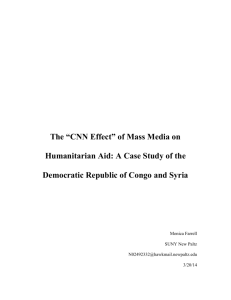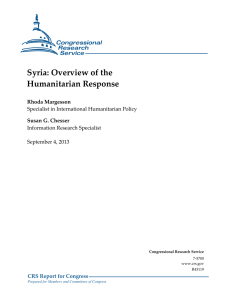DOC - Europa
advertisement
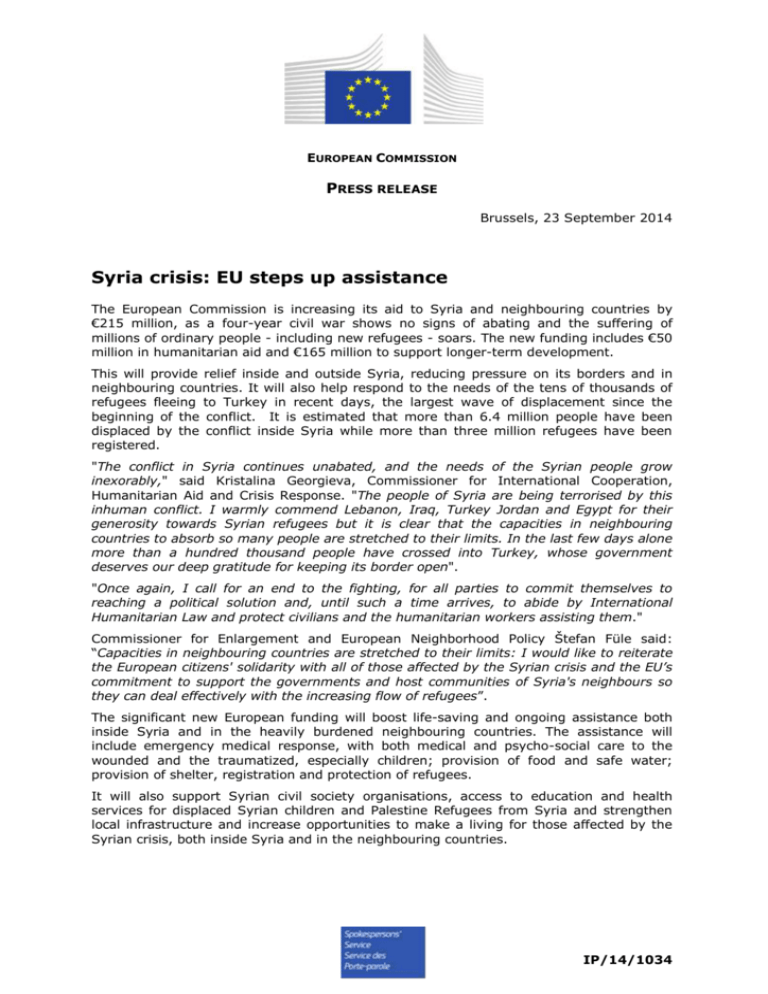
EUROPEAN COMMISSION PRESS RELEASE Brussels, 23 September 2014 Syria crisis: EU steps up assistance The European Commission is increasing its aid to Syria and neighbouring countries by €215 million, as a four-year civil war shows no signs of abating and the suffering of millions of ordinary people - including new refugees - soars. The new funding includes €50 million in humanitarian aid and €165 million to support longer-term development. This will provide relief inside and outside Syria, reducing pressure on its borders and in neighbouring countries. It will also help respond to the needs of the tens of thousands of refugees fleeing to Turkey in recent days, the largest wave of displacement since the beginning of the conflict. It is estimated that more than 6.4 million people have been displaced by the conflict inside Syria while more than three million refugees have been registered. "The conflict in Syria continues unabated, and the needs of the Syrian people grow inexorably," said Kristalina Georgieva, Commissioner for International Cooperation, Humanitarian Aid and Crisis Response. "The people of Syria are being terrorised by this inhuman conflict. I warmly commend Lebanon, Iraq, Turkey Jordan and Egypt for their generosity towards Syrian refugees but it is clear that the capacities in neighbouring countries to absorb so many people are stretched to their limits. In the last few days alone more than a hundred thousand people have crossed into Turkey, whose government deserves our deep gratitude for keeping its border open". "Once again, I call for an end to the fighting, for all parties to commit themselves to reaching a political solution and, until such a time arrives, to abide by International Humanitarian Law and protect civilians and the humanitarian workers assisting them." Commissioner for Enlargement and European Neighborhood Policy Štefan Füle said: “Capacities in neighbouring countries are stretched to their limits: I would like to reiterate the European citizens' solidarity with all of those affected by the Syrian crisis and the EU’s commitment to support the governments and host communities of Syria's neighbours so they can deal effectively with the increasing flow of refugees”. The significant new European funding will boost life-saving and ongoing assistance both inside Syria and in the heavily burdened neighbouring countries. The assistance will include emergency medical response, with both medical and psycho-social care to the wounded and the traumatized, especially children; provision of food and safe water; provision of shelter, registration and protection of refugees. It will also support Syrian civil society organisations, access to education and health services for displaced Syrian children and Palestine Refugees from Syria and strengthen local infrastructure and increase opportunities to make a living for those affected by the Syrian crisis, both inside Syria and in the neighbouring countries. IP/14/1034 Background The conflict in Syria is in its fourth year and shows no signs of abating. The crisis has become the largest humanitarian and security disaster in the world. The humanitarian consequences have reached an unprecedented scale with an estimated 10.8 million people inside Syria needing assistance. Out of these, more than 6.4 million people are internally displaced. It is now estimated that 4.7 million people reside in areas that are hard to reach, including about 241 000 people who continue to live in areas that are besieged by either government or opposition forces. A further three million people have been forced to flee and find refuge in neighbouring countries. Up to 191 000 people have lost their lives in the conflict and many thousands more have been wounded. An entire generation of children has been exposed to war, violence and death, and has been deprived of basic freedoms, protection and education. The EU humanitarian assistance, channelled through mandated and professional partners (UN agencies, NGOs and the Red Cross/Crescent family), is provided, to all people in need: the internally displaced, refugees and host populations, in accordance with humanitarian principles and needs. The EU humanitarian aid primarily supports life-saving food and nutritional items, medical emergency responses, shelter, distribution of basic non-food items, safe water, sanitation and hygiene and protection, including gender based violence and child protection. Preparing for the coming winter is a priority, delivering shelter, blankets and core-relief items to those most in need before the onset of the cold weather. In the area of essential health services, the Commission shall continue to support the immunisation campaigns of polio and measles, helping to protect people against this life-threatening disease. The provision of essential drugs, maternal and reproduction health services will continue. In the neighbouring countries, the Commission and our humanitarian partners will continue to support vulnerable newcomers with the provision of food, shelter, hygiene and winterisation. For more information The European Commission's humanitarian aid and civil protection: http://ec.europa.eu/echo/index_en.htm Commissioner Georgieva's website: http://ec.europa.eu/commission_2010-2014/georgieva/index_en.htm Commissioner Füle's website: http://ec.europa.eu/commission_2010-2014/fule/index_en.htm Contacts : David Sharrock (+32 2 296 89 09) Irina Novakova (+32 2 295 75 17) Peter Stano (+32 2 295 74 84) Anca Paduraru (+32 2 296 64 30) For the public: Europe Direct by phone 00 800 6 7 8 9 10 11 or by e-mail 2
